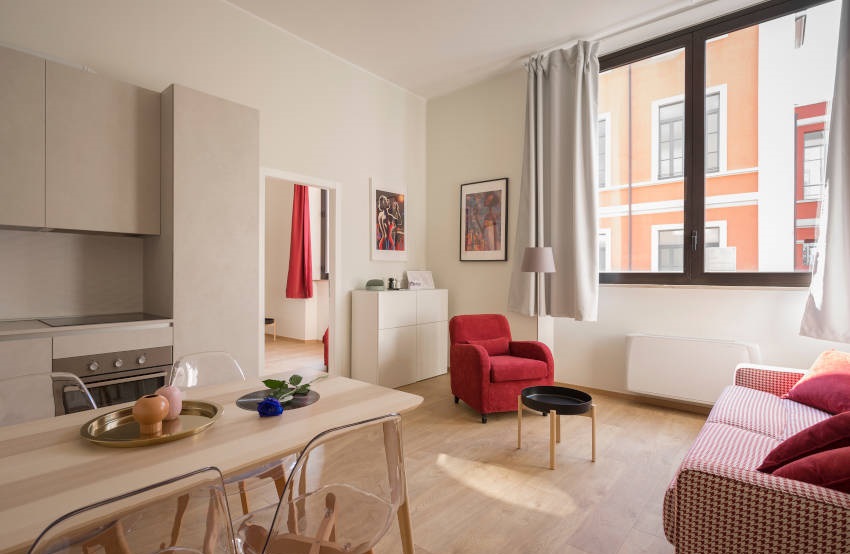Travel nursing, a profession that allows nurses to utilise their skills whilst exploring new locations, presents a unique set of challenges. One of the most significant is securing quality midterm accommodation for each new assignment. Shared accommodation offers a practical and cost-effective solution to this issue. Let’s explore the concept of shared accommodation for travel nurses in more detail.

Understanding Shared Accommodation
Shared accommodation refers to the practice of renting a property, such as a house, flat, or room, in conjunction with other individuals. This arrangement can significantly reduce expenses and provide a more comfortable living environment. For travel nurses, shared accommodation could involve sharing a property with other travel nurses or local residents.
Locating Shared Accommodation
Aside from JustMiddies, there are several other online platforms that can assist travel nurses in finding shared accommodation. These include:
- Furnished Finder: This website specialises in locating short-term accommodation for travel nurses and other healthcare professionals.
- Airbnb: Airbnb provides a variety of accommodation options, ranging from single rooms to entire flats or houses.
- VRBO: VRBO provides a range of short and long-term accommodation options, including homes, flats, and condos.
Factors to Consider When Choosing Shared Accommodation
When selecting shared accommodation, several factors should be taken into account:
- Location: The accommodation should be conveniently situated near your place of work. Consider the area of town, availability of public transportation, free or paid parking, and distance from the hospital.
- Facilities: Amenities such as on-site laundry and a fully equipped kitchen are often important for travel nurses. Also, consider whether utilities like cable, Wi-Fi, gas/electric, water, trash, and sewer are included or not.
- Privacy: It’s crucial to ensure that your privacy is respected within the shared accommodation. If you are planning on renting a room, decide if you are okay sharing a space with another traveller or if you would prefer to room alone.
- Cost: While shared accommodation is generally more affordable than renting an entire property independently, it’s still important to consider the cost and ensure it fits within your budget. Housing costs will vary based on your location so do your research. Rural areas tend to have a lower cost of living compared to large, popular cities.
- Lease Flexibility: Seek out accommodation options that offer month-to-month leases or flexible lease terms. Since many travel nursing jobs are posted just 6-8 weeks before the assignment’s start date, you’re often left with only a short amount of time to secure housing.
- Agency-Provided Housing: Some travel nurse agencies have contracts with hotels, lodgings, and estate agents to provide accommodation to their employees. In this case, the nurse doesn’t have much of a say in the matter — they will have to stay at the housing provided by their employer.
- Communication: Communicate your needs and preferences to your agency or landlord.
- Reviews: Check travel nurse housing reviews and experiences shared by other nurses.
- Verification: Verify the accommodation’s location, amenities, and safety measures before committing to any agreements.
- Virtual Tour: Arrange for a virtual tour or ask for photos of the actual property so you can make an informed decision.
Understanding the Laws and Regulations
The laws and regulations for shared accommodation can indeed vary by state in the U.S. For travel nurses in particular, there are several key considerations when it comes to shared accommodation:
- Lease Terms: Travel nursing contracts typically last 13 weeks, although they can be both longer or shorter. Therefore, if you must lease your property for longer than that, then travel nursing is not the right market for you. Travel nurses and companies typically look for month-to-month housing options.
- Furnishings: It’s very difficult for travel nurses to manage unfurnished properties. They rarely, if ever, travel with furniture in tow. Therefore, fully furnished accommodations with basic home goods are highly desirable.
- Contract Cancellations: Hospitals can cancel travel nursing contracts for any number of reasons. Moreover, travel nurses are away from home so they may come across any number of reasons to cancel a contract early.
- Shared Spaces: If the accommodation involves shared spaces, any restrictions on when these can be used could impact the desirability of the property.
- Agency-Provided Housing: Some travel nurse agencies have contracts with hotels, lodgings, and estate agents to provide accommodation to their employees. In this case, the nurse doesn’t have much of a say in the matter — they will have to stay at the housing provided by their employer.
It’s always a good idea to consult with a local real estate attorney or housing authority to understand the specific laws and regulations in your state. They can provide guidance on your rights and responsibilities as a tenant in a shared accommodation setting.
Shared accommodation can be an excellent choice for travel nurses. It offers a cost-effective and flexible housing solution, allowing you to concentrate on your work and enjoy your new location. Safe travels!

